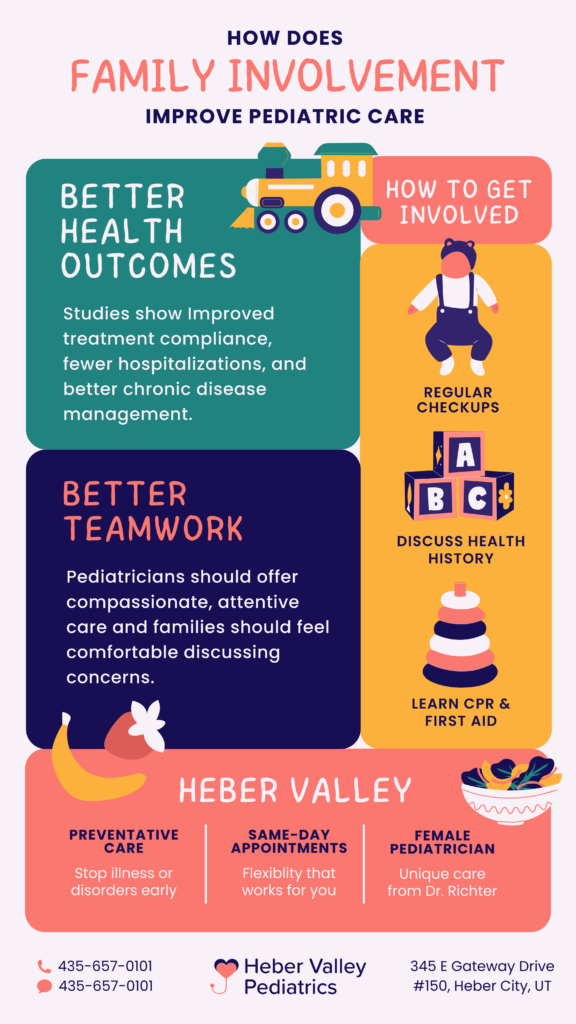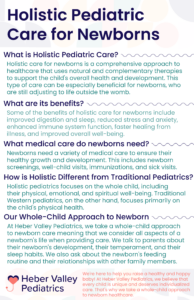The Importance of Family Involvement
Involving families in their child’s pediatric care is important if you want to create a supportive, healthy environment for children. When families actively participate, it improves the effectiveness of medical care and promotes a holistic approach to the child’s well-being. Heber Valley Pediatrics offers pediatric care in Heber, so we know a few strategies to involve the whole family in your child’s wellbeing.
Understanding Pediatric Care
Pediatric care refers to the medical attention provided to children from infancy through adolescence. Pediatricians are specialized doctors trained to address the unique medical needs of children, which differ significantly from adults. Our Heber female pediatrician, Holly Richter, is important to our team since patients frequently report higher satisfaction levels with female doctors, leading to better adherence to treatment plans and overall health outcomes. Our pediatricians help with preventive health care, the diagnosis and treatment of acute and chronic diseases, and the monitoring of physical, emotional, and social development.
Family involvement in pediatric care is important for several reasons:
1. Better Communication: Families who actively participate in their child’s medical appointments encourage better communication between the pediatrician and the child. Families who provide in-depth information about the child’s health history, behavior, and symptoms help a pediatrician create an accurate diagnosis and effective treatment plan.
2. Emotional Support: Children feel more secure and less anxious when their family is involved in their care. This emotional support is important, especially during scary medical procedures or when managing chronic conditions.
3. Better Health Outcomes: Studies have shown that children whose families are involved in their care have better health outcomes. Active family participation leads to improved compliance with treatment plans, fewer hospitalizations, and better management of chronic diseases.
4. Empowerment and Education: We have seen how families who are involved in their child’s pediatric care in Heber become more knowledgeable about their child’s health needs. This allows them to make better decisions and support their child’s well-being.

Strategies for Family Involvement
Here are some practical strategies to ensure families are actively involved in their child’s pediatric care:
1. Regular Communication with Pediatricians
– Scheduling Regular Check-Ups: Making sure that your child attends all scheduled well-child visits. These appointments are necessary for monitoring growth, development, and early detection of potential health issues.
– Preparing for Appointments: Make a list of questions or concerns before each visit. Being prepared like this makes sure that all important topics are covered during the appointment.
– Discussing Health History: Provide detailed information about the child’s medical history, including any past illnesses, surgeries, allergies, and medications.
2. Education and Training
– Understanding Medical Conditions: If your child has a specific medical condition, take the time to learn about it. Pediatricians can provide resources and recommend support groups or educational materials.
– First Aid and CPR Training: Parents and caregivers should consider getting certified in pediatric first aid and CPR. This training can be lifesaving in emergency situations.
3. Promoting Healthy Lifestyles
– Nutrition and Exercise: Encourage a balanced diet and regular physical activity. Discuss dietary guidelines with your male or our Heber female pediatrician and develop an exercise plan that is appropriate for your child’s age and abilities.
– Sleep Hygiene: Heber Valley Pediatrics knows firsthand how a lack of sleep can affect a child’s pediatric care in Heber. Establish a consistent bedtime routine and create a sleep-friendly environment.
– Mental Health: Pay attention to your child’s emotional and mental well-being. Start some open conversations and provide a safe space for them to express their feelings.
4. Medication Management
– Understanding Prescriptions: Families must understand the purpose, dosage, and potential side effects of any medications their child is prescribed. Ask the pediatrician or pharmacist if you have any questions.
– Commitment to Treatment Plans: Follow the pediatrician’s instructions regarding medication schedules and dosages. Use tools like medication charts or alarms to help stay on track.
5. Advocating for Your Child
– School and Community Involvement: Work with your child’s school to give them any necessary accommodations or support. This may include creating an Individualized Education Plan (IEP) for children with special needs.
– Participating in Support Groups: Join parent support groups related to your child’s condition or overall health and development. Sharing experiences with other parents can provide helpful information and emotional support.
6. Creating a Plan for Pediatric Care in Heber
– Collaborative Planning: Create a thorough health care plan with your pediatrician. This plan should include medical treatments, therapies, and preventive measures specific to your child’s needs.
– Regular Review and Updates: Regularly review and update the health care plan to reflect any changes in your child’s condition or treatment. Regularly check in with your pediatrician to be sure the plan is always effective.
The Role of Technology
Technology can play a big role in helping family involvement in pediatric care:
1. Electronic Health Records (EHRs): Access to EHRs allows families to view their child’s medical history, test results, and treatment plans. This transparency simplifies better communication and coordination with healthcare providers.
2. Telehealth: Virtual appointments can be convenient for families with busy schedules or those living in remote areas. Telemedicine provides access to pediatric care in Heber without the need for travel, making it easier to maintain regular check-ups.
3. Health Apps and Tools: There are so many health apps that can help families manage their child’s health. These tools can track medication schedules, monitor symptoms, and provide educational resources.
4. Online Support Communities: Social media and online forums are great platforms for parents to connect, share experiences, and seek advice. These communities can provide emotional support and practical tips for managing different health conditions.
Overcoming Challenges
While family involvement in pediatric care is worthwhile, it can also present challenges:
1. Time Constraints: Balancing medical appointments with work, school, and other responsibilities can be challenging. Prioritize healthcare and consider flexible scheduling options with our Heber female pediatrician. Heber Valley Pediatrics offers same-day appointments to make things easier.
2. Emotional Stress: Managing a child’s health condition can be emotionally taxing. Get support from friends, family, or professional counselors to help cope with stress and anxiety.
3. Financial Burden: The cost of medical care can be a significant concern. Explore insurance options, government assistance programs, and charitable organizations that provide financial support for families in need.
4. Navigating Complex Healthcare Systems: Understanding and navigating the healthcare system can be overwhelming. Don’t hesitate to ask one of our pediatricians for guidance or referrals to specialists in pediatric care in Heber.
The Pediatrician-Family Partnership
Strong teamwork between a pediatrician and the family creates better outcomes for your child:
1. Mutual Respect and Trust: Building a relationship based on mutual respect and trust is the first step. Families should feel comfortable discussing their concerns, and pediatricians should listen attentively and provide compassionate care.
2. Collaborative Decision-Making: Involving families in the decision-making process regarding their child’s treatment is very important. This collaboration makes sure that the care plan aligns with the family’s values and preferences.
3. Continuous Feedback: We encourage open feedback from families about their child’s care. Our pediatricians use this feedback to improve their services and address any concerns right away.
Heber Valley Pediatrics
Family involvement in pediatric care is an important strategy that requires commitment, communication, and collaboration. By actively participating in their child’s medical journey, families can guarantee better health outcomes, provide emotional support, and understand situations better. Remember, a child’s health and well-being are a shared responsibility, and together with pediatricians, families can create a safe environment that encourages lifelong health.
Whether it’s through regular communication with healthcare providers, promoting healthy lifestyles at home, or using technology, every effort counts. Overcoming challenges and building strong teamwork with your doctor of pediatric care in Heber can make a huge difference in your child’s healthcare. Take on this role with confidence, knowing that Heber Valley Pediatrics is with you every step of the way.





